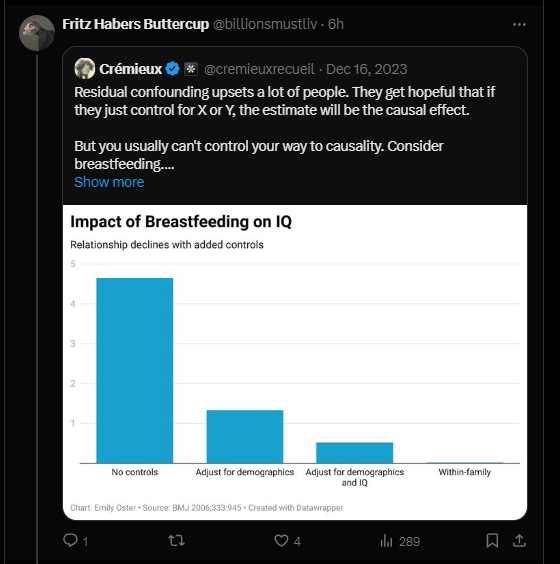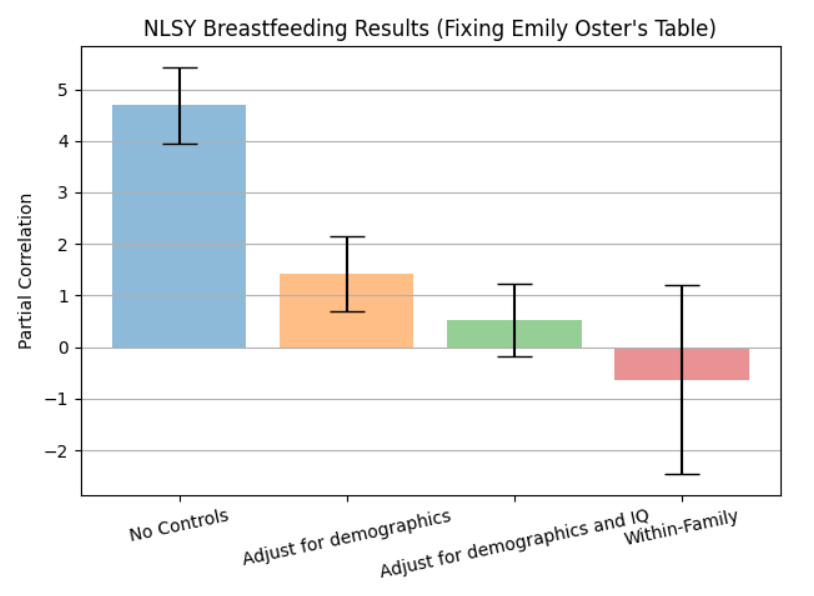Recently on X, I posted the following chart:
What it shows is that breastfeeding is associated with higher IQs, but part of this is due to higher IQ and higher socio-economic status (SES) mothers tending to breastfeed more than lower IQ and lower SES mothers. However, a significant component remains when these factors are controlled for.
This result is pretty robust to the child’s age (it doesn’t seem to fade out between 7 and 14), and longer breastfeeding matters more than shorter term breastfeeding.
Now, if the result is robust to mother’s IQ score, what else could effect it? Breastfeeding intuitively seems like a more reasonable environmental effect than most other things. It has to do with nutrition at a very young age where the brain is rapidly developing. Maybe wives of smarter husbands breastfeed more, because their husbands read posts like this and get them to breastfeed more than they otherwise would?
This sounds more likely than babies with higher gene scores receiving more breastfeeding than babies with lower gene scores, but it’s still quite unlikely. What would the correlation between the father’s IQ and breastfeeding, controlled for mother’s IQ, plausibly be? Probably not more than 0.10. Combine that with high spousal correlations for IQ and you also get range restriction — husbands don’t vary as much in IQ with respect to their wives’ IQs as they would if they were randomly matched couples.
Nevertheless, if breastfeeding is causal for higher IQ, it should show up in a within families design. Getting more breastfeeding than your mean sibling should be associated with having a higher IQ than your mean sibling. Maybe later born children tend to get less breastfeeding, so control for birth order too. And parental ages if you’re feeling generous (womb quality, mutational load, etc). This should give the causal effect of breastfeeding on IQ.
Do we have any studies like this? Well, some people claim so:
Here are the actual results:
I have fixed the chart:
It’s unclear why the original chart doesn’t have the right point estimate for within-family, and where the error bars went. As you can see from the confidence intervals, the hypothesis that breastfeeding for a year increases baby IQ by a few IQ points is not able to be rejected by the data.
Another plausibly-causal design gives the same results.
The causal studies are just underpowered. Surely big social science can spare some money for a high powered well designed study on this? This is mainstream stuff, easily permitted within the SSSM.
I conclude that it’s possible but not completely proven that breast feeding has a small positive impact on child IQ.
Cremieux disagrees though, saying this is weak evidence against the idea that there is a positive effect. I disagree, if a 2 point increase in IQ from breast feeding is the null hypothesis, the p value from the confidence interval’s we’ve seen would be maybe 30% or 40%, maybe more. But, he also points out that the point estimate is negative, indicating that perhaps, controlled for parent’s IQ, there’s a negative partial correlation between breastfeeding and IQ.
What this shows is that breastfeeding gene scores correlate with IQ gene scores more than breastfeeding correlates with IQ in the UK Biobank sample. The heritability of breastfeeding is about 40%, but the correlation of that gene score with breastfeeding is probably lower, potentially less than 10%.
Still, if we let it be 40%, the ~-.2 estimate gives the correlation between phenotypic IQ and breastfeeding controlled for the UK Biobank IQ gene score. This could mean that breastfeeding is an environmental thing that lowers IQ, or some other environmental thing that lowers IQ increases breastfeeding in the UK. It’s not per se a straightforward estimate of the effect of breastfeeding on IQ.
In particular, there could be a demographic variable that correlates more with IQ (negatively) than it does the UKBB IQ gene score, that also correlates with breastfeeding (positively). Think about it, would breastfeeding really cause a decrease in IQ over formula?
My takeaway is that the effect is definitely small, if it exists (<3 points of IQ in either direction), and it shouldn’t compound between generations (unlike mutational load), so choosing wrong won’t be catastrophic. Still, it would be nice to have better studies on this topic, because the higher possible end of the potentially effect is pretty large as far as environmental effects go.












More likely for it to be a positive effect, why should it harm brain development
Could the effect be mediated?
If the mother has a lot of contaminants in her breastmilk, or is nutrient deficient, formula might ne superior. Absent those, breastfeeding probably is.